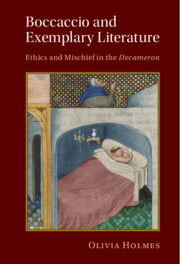Book contents
- Boccaccio and Exemplary Literature
- Cambridge Studies in Medieval Literature
- Boccaccio and Exemplary Literature
- Copyright page
- Epigraph
- Contents
- Acknowledgments
- Introduction
- Chapter 1 Ethical Fables and Antifeminist Exempla
- Chapter 2 From Sermon Story to Novella
- Chapter 3 Lives of Saints; Lives of Sinners
- Chapter 4 Classical and Vernacular Exempla
- Chapter 5 Magister Amoris
- Afterword in Time of Plague
- Notes
- Bibliography
- Index
- Cambridge Studies in Medieval Literature
Chapter 4 - Classical and Vernacular Exempla
Published online by Cambridge University Press: 02 February 2023
- Boccaccio and Exemplary Literature
- Cambridge Studies in Medieval Literature
- Boccaccio and Exemplary Literature
- Copyright page
- Epigraph
- Contents
- Acknowledgments
- Introduction
- Chapter 1 Ethical Fables and Antifeminist Exempla
- Chapter 2 From Sermon Story to Novella
- Chapter 3 Lives of Saints; Lives of Sinners
- Chapter 4 Classical and Vernacular Exempla
- Chapter 5 Magister Amoris
- Afterword in Time of Plague
- Notes
- Bibliography
- Index
- Cambridge Studies in Medieval Literature
Summary
Chapter 4 charts the Decameron’s rewritings of exemplary anecdotes by Roman historical authors. The young Boccaccio has been associated with Trecento vernacularizations of Livy, Ovid, and Valerius Maximus, and his early engagement with translation and his commitment to Italian literary culture are indisputable. This chapter investigates how novella 2.9’s revision of the episode of Lucretia’s suicide in Livy participates in larger debates about the nature of women and the usefulness of generalizations. It also examines Decameron 4.1 – which takes its details from the suicide of Sophonisba – to argue that in killing herself like her classical forerunners, Ghismunda attributes a closer analogy between her situation and theirs than is warranted. The end of the chapter concentrates on Day 10, dedicated to the virtue of magnanimity, especially tales 10.3, 10.6, and 10.8, which echo exempla from Valerius Maximus’ Memorable Doings and Sayings. Although all of this day’s stories seem straightforward narratives of magnificent deeds worthy of imitation, the tales slide inadvertently into ambiguity and parody, belying their ethical pretensions.
Keywords
- Type
- Chapter
- Information
- Boccaccio and Exemplary LiteratureEthics and Mischief in the <i>Decameron</i>, pp. 146 - 173Publisher: Cambridge University PressPrint publication year: 2023

